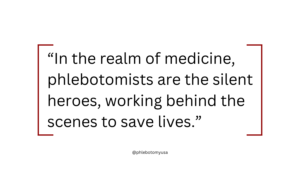19 Jun Why Phlebotomists Are the Heroes of Healthcare
Phlebotomists serve as the foundation for diagnostic processes in healthcare. Without the precise work of phlebotomists, doctors would lack the critical data needed to diagnose various conditions. Whether it’s determining if someone is anemic, checking liver function, or identifying infections, the accuracy of blood tests relies heavily on the skill of the phlebotomist. This precision is what makes phlebotomists indispensable to the medical field.
What are Phlebotomists?
Have you ever heard the term ‘phlebotomist’ and wondered what it means? It’s just a fancy word for a person who draws blood. Even though this job sounds simple, it is essential in the world of medicine. It allows doctors to find out how healthy our bodies are quickly. Additionally, a phlebotomist’s job helps us to give to those in need. This article will explore what phlebotomists are, what they do, and why they are so important.
Blood Experts
Phlebotomists are like our ‘blood experts.’ They are trained to easily find veins and take blood without causing much pain. They handle each blood sample carefully. Thanks to them, doctors can run both simple and complicated tests. These tests can help discover if someone is anemic, has liver issues, or has other health problems.
The Art of Venipuncture
Venipuncture is the process of drawing blood from a vein. It is a skill that requires both precision and care. Phlebotomists are trained in this procedure to make sure that blood samples are collected with minimal discomfort to the patient.
In addition to venipuncture, phlebotomists are also skilled in capillary sampling. This involves taking small blood samples from the finger, heel, or ear lobe. These skills help make sure that the blood drawn is sufficient for accurate testing and diagnosis.
Maintaining Accuracy
The accuracy of blood tests is essential for effective diagnosis and treatment. Phlebotomists make sure that samples are properly labeled, stored, and transported to the lab. Any errors in these steps could lead to incorrect test results, which can have serious implications for patient care. Therefore, phlebotomists must follow strict protocols to maintain the integrity of each sample they collect.
Health Monitors
Phlebotomists do more than help find out what’s wrong. If you’re taking medicine, they take blood samples to check if it works correctly. These tests help doctors see if they need to change the dose. In a way, phlebotomists help track our health and make sure we’re doing well.
Monitoring Treatments
For patients with chronic conditions like diabetes, heart disease, or cancer, regular blood tests are important. Phlebotomists collect these samples to give doctors the information they need to track how well a treatment is working. For example, in diabetes patients, phlebotomists collect blood to check glucose levels to help doctors adjust insulin doses when needed. This regular monitoring helps keep patients healthy and makes sure treatments are effective.
Helping with Disease Management
Phlebotomists also assist in managing diseases. For instance, patients with clotting disorders regularly draw blood to see how well blood-thinning medications are working. By providing accurate samples, phlebotomists help doctors make important decisions that improve patient care and health outcomes.
Guardians of Giving
A phlebotomist was likely helping you if you’ve ever donated blood or organs. They guarantee donors are fit by doing tests and following strict rules. When you donate blood, phlebotomists make sure it’s done right. They take the blood carefully and handle it safely. Thanks to them, your donated blood can help save lives.
Supporting Life-Saving Donations
Blood donation is a vital component of healthcare, and phlebotomists are the professionals who make it all possible. Whether at a blood drive, hospital, or clinic, phlebotomists make sure that blood is collected safely and efficiently. They also make sure that donors are healthy enough to give blood and that the collected blood is stored properly for future use. Without phlebotomists, the life-saving act of blood donation would not be possible.
Donor Safety
The safety of blood donors is a top priority for phlebotomists. Before any blood is drawn, phlebotomists conduct thorough screenings to ensure that the donor is in good health and meets all the necessary criteria for donation. This process includes checking the donor’s medical history, measuring vital signs, and making sure that the donor is hydrated and comfortable. By taking these precautions, phlebotomists protect the health of the donor and guarantee that the donated blood is safe for recipients.
Handling and Storing Donations
Once blood is collected, phlebotomists are responsible for labeling and storing it correctly. This is a critical step, as any mistakes in labeling or storage could lead to the wrong blood type being given to a patient, which can have life-threatening consequences.
Phlebotomists follow strict protocols to ensure that each unit of blood is correctly identified and stored at the right temperature until it is needed. Their detailed work helps make certain that blood donations are available when and where they are needed most.
Thank You, Phlebotomists
In the big world of healthcare, phlebotomists work mostly behind the scenes. But they’re super important. When you get a blood test or donate blood, it’s thanks to them that everything goes well. They make sure tests are right and donations are safe. Remember to appreciate them for their essential role in healthcare when you meet them. They’ve earned it!
Recognizing Their Contribution
While phlebotomists may not always be in the spotlight, their contributions to healthcare are invaluable. From the diagnostic process to treatment monitoring and blood donation, phlebotomists are there every step of the way so that the medical system runs smoothly. Their work requires a unique combination of technical skills, attention to detail, and compassion for patients. It’s important to recognize and appreciate the vital role phlebotomists play in keeping us healthy.
Joining the Phlebotomy Profession
If you’re considering a career in healthcare, becoming a phlebotomist is a great way to make a difference. Phlebotomists are in high demand, and the training required to enter the field is relatively short compared to other healthcare professions.
We offer inclusive training programs at Phlebotomy Training Specialists that prepare you to excel as a phlebotomist. With locations across the United States, we provide the hands-on experience and support you need to succeed. Explore our training opportunities here and take the first step towards a rewarding career in phlebotomy.


